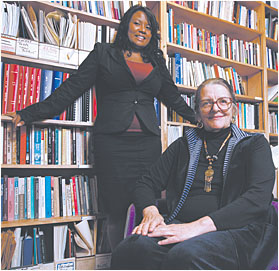
Jill McCalla Vickers, BAHon/65, is one of the most influential scholars in the field of women and politics in Canada—in fact, Laura Macdonald, chair of the department of political science, credits her with the field’s creation. So what better way to celebrate Vickers’ 37-year career at Carleton than with a conference dedicated to women and democracy?
For two days in November 2007, Women-Friendly Democracy: Conference in Honour of Jill McCalla Vickers examined ways in which political systems can be made more inclusive to the interests of women, and in turn, reflect social diversity. Many of the panelist and participants were Vickers’ former students and colleagues, including some men that Vickers “lured into gender studies”.
“It was a great pleasure to see former students and where their paths have taken them,” says Vickers. “A good number of people in the next two cohorts of gender in politics research were my students. It’s rewarding to see my teaching had that effect.”
Hosted by the department of political science, the conference provided an opportunity for students and colleagues to show their respect for Vickers’ academic and social contributions. Although Vickers retired in July 2007, as a distinguished research professor she continues to teach, conduct research and write in areas such as women’s efforts to contribute to democracy and their participation in nationalist movements.
Since joining the Carleton faculty in 1971, Vickers has combined teaching and scholarly analysis with direct involvement in both mainstream and women’s politics. She has contributed to the understanding of women and political representation, issues of disability and race, gender and nationalism. Her direct involvement has taken many forms, from submission of dozens of reports advising government agencies to serving as Parliamentarian of the National Action Committee on the Status of Women for five years.
Vickers characterizes her long battle for women’s rights as “building bridges between governments and women.” As she explains, “They’re our governments, too, and we must get them to pay attention to women’s issues and values.”
With files from Carleton Now.
Next …
Politics: Get out the vote